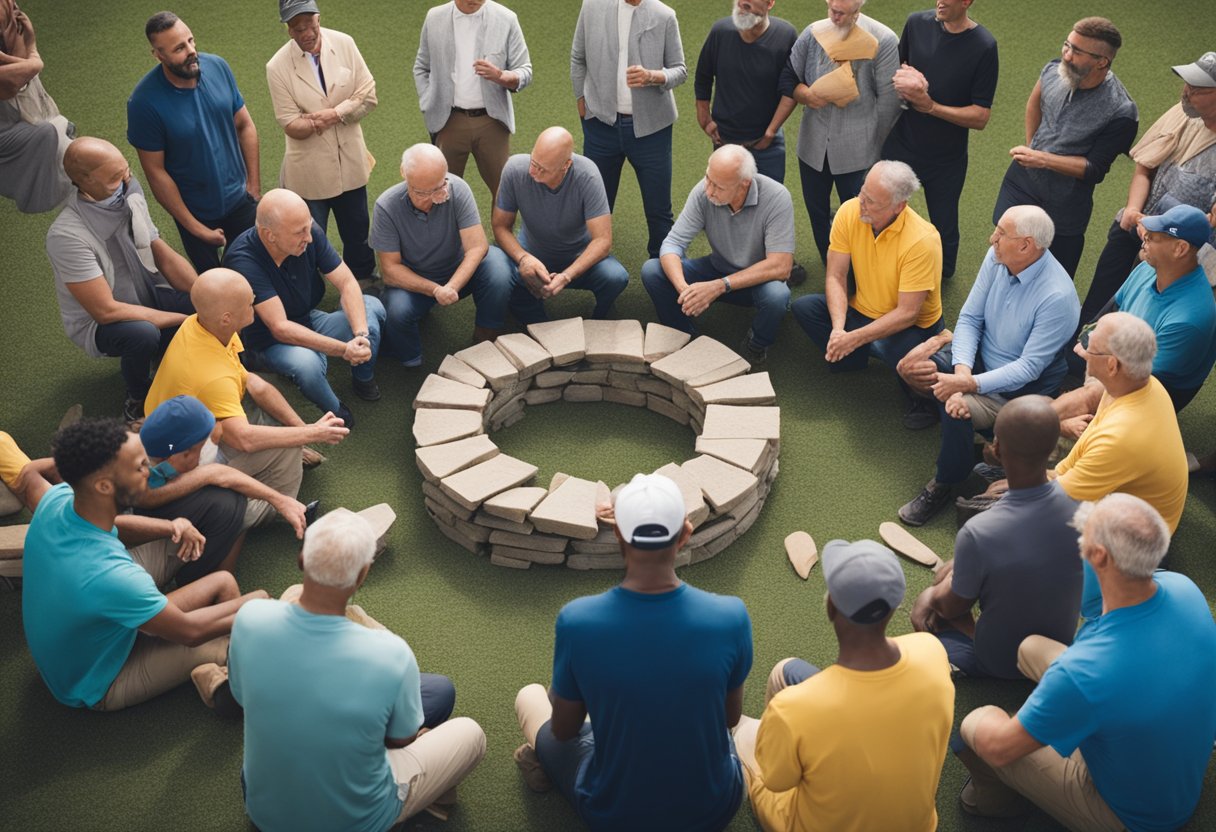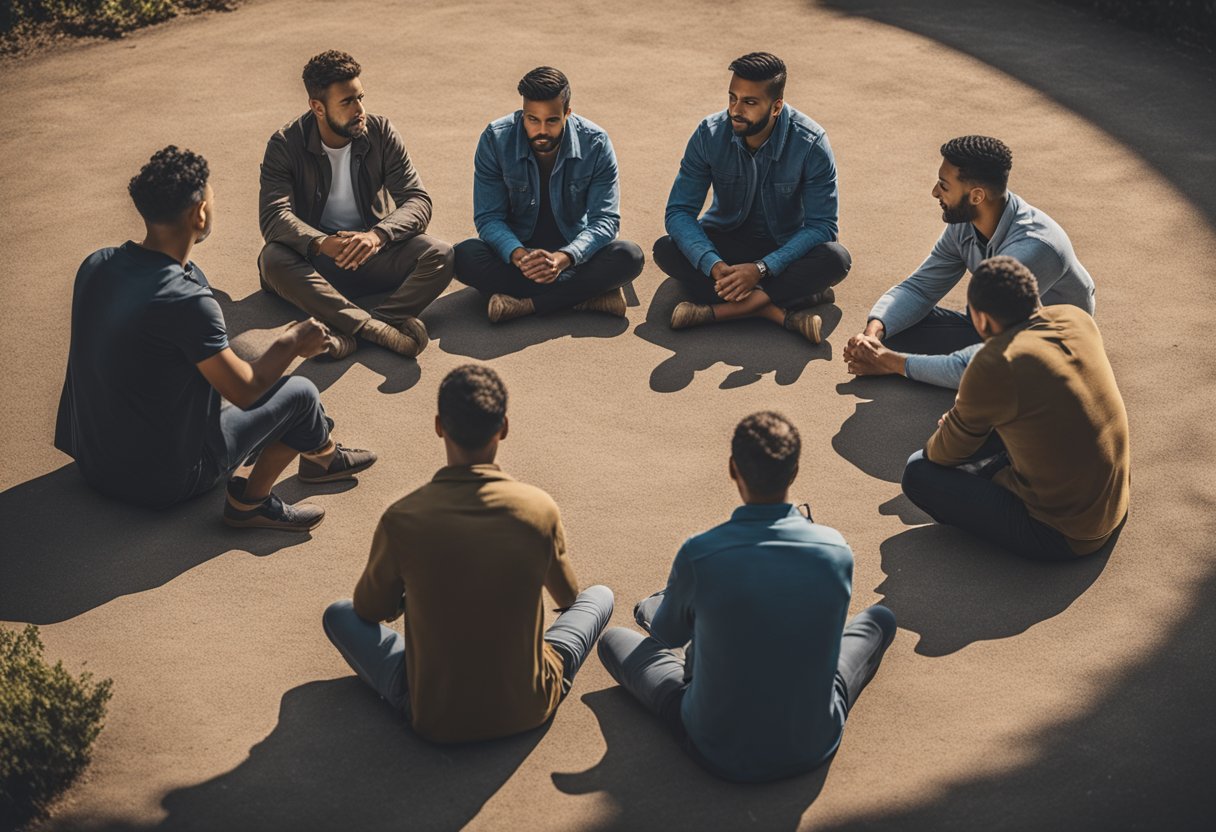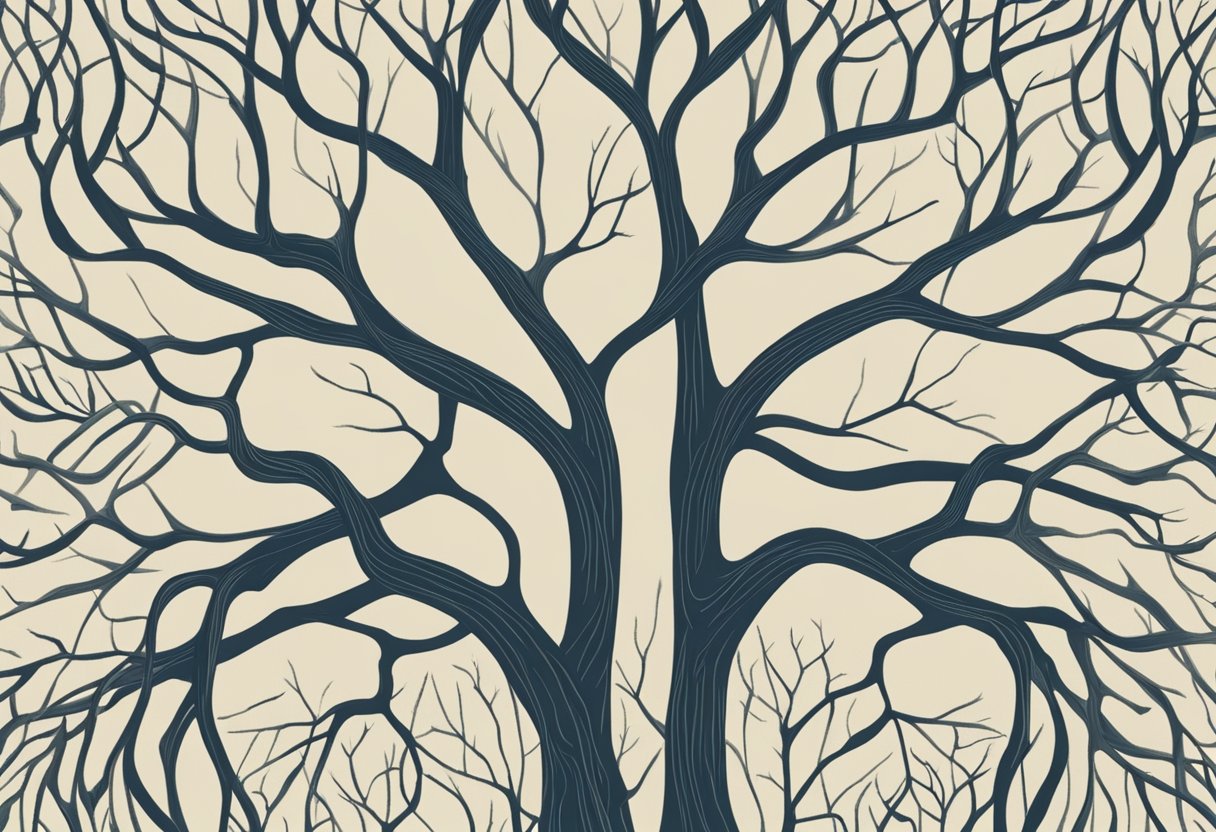Building Stronger Support Systems
Having faced lymphoma twice, I’ve come to understand the true meaning of resilience and strength.
Navigating cancer as a male thriver brings unique challenges but also opens the door to deeper, more meaningful connections.
Throughout my journey, I’ve found that my bonds with fellow survivors and loved ones have grown much more substantial.

Many men with cancer find that their emotional landscapes shift dramatically. This experience often leads to profound empathy and a greater appreciation for relationships.
As a thriver, I’ve discovered that communication and shared experiences are vital to nurturing these connections.
Support systems play a crucial role in the lives of male cancer survivors.
From family members to specialized support groups, these networks offer a foundation of strength and understanding.
Embracing these connections has been essential for my emotional and physical well-being, helping me adapt and find joy in everyday life.
Key Takeaways
- Male cancer thrivers develop deeper connections and empathy.
- Strong support systems are vital for emotional and physical health.
- Sharing experiences and open communication are key to nurturing relationships.
Understanding the Male Cancer Thriver

Many men who survive cancer experience a profound shift in their perspective on life and relationships. They often develop a more profound sense of identity that transcends their illness.
The Psychological Journey
Facing a cancer diagnosis can be a daunting experience for anyone.
From my experience, surviving lymphoma twice, this journey changes one’s psyche in ways that are hard to imagine.
Dealing with emotional highs and lows, from the initial shock to reaching a state without evidence of disease, shapes one’s outlook on life.
A common thread among cancer men is the feeling of becoming a warrior. This warrior mindset helps them battle through treatments, setbacks, and recovery.
They often find strength in their vulnerability, understanding that seeking support during tough times is okay.
Many of us become more resilient and empathetic for ourselves and others facing similar battles.
Identity Beyond Illness
After surviving cancer, men often redefine their identity, seeing themselves as more than just survivors or thrivers.
For me, it wasn’t just about beating the disease; it was about embracing my life in new ways.
I found that my relationships with loved ones grew more profound and more meaningful.
Establishing an identity beyond illness involves recognizing oneself as a multifaceted individual—someone who is not just marked by the battles fought but also by everyday joys and accomplishments.
This perspective is grounded in reality, avoiding exaggerated claims about life post-cancer.
Focusing on personal growth and deeper connections can help many people find a renewed sense of purpose and passion in their lives.
Emotional Landscapes of Male Cancer Survivors

Experiencing cancer deeply affects men, reshaping their emotional landscapes. Many report stronger bonds with others and an increased sense of empathy, creating cherished connections.
Navigating Emotional Complexity
Being diagnosed with cancer brings a whirlwind of emotions.
I’ve faced incredible highs and lows during my fight twice with lymphoma. Stress is a constant companion, often influencing emotions in unexpected ways.
Some days, I felt overwhelmed by fear and sadness; others, hope carried me through.
Emotional depth often increases after battling cancer. There’s a heightened emotional intimacy as we become more open about our feelings.
Acknowledging emotions, whether anger or gratitude, becomes a part of everyday life. Empathy for others grows as well.
We understand their struggles deeply, having walked a similar path.
Building Emotional Support Networks
Connecting with others is crucial for emotional well-being.
I found that building emotional support networks made a significant difference throughout my journey.
Fellow survivors understand experiences that others might not fully grasp.
Sharing stories, fears, and victories with them created an unspoken bond of empathy and support.
Loved ones play a pivotal role, too. Their unwavering presence forms a safety net of emotional support.
Open communication, genuine listening, and shared moments enhance these connections.
Taking part in support groups and counseling can further solidify these networks.
These connections, grounded in shared experiences and emotions, offer strength and resilience, lightening the emotional burden we carry.
Physical and Medical Considerations

Managing physical health and medical treatments as a male cancer thriver requires clarity about recovery steps and adapting to long-term changes in life. This involves navigating treatment options and coping with lasting physical changes.
Treatments and Recovery
Throughout my battles with lymphoma, I found that treatment plans varied significantly.
Standard options include chemotherapy, radiation, and sometimes surgery.
Each of these has unique effects on the body. For blood cancers and pancreatic cancer, chemotherapy remains a frequent choice.
It uses powerful drugs to kill cancer cells but often comes with side effects like fatigue and nausea.
Radiation therapy targets specific areas to shrink tumors, while surgery can physically remove cancerous tissues.
I underwent surgery twice; recovery was physically demanding but crucial for long-term health.
Follow-up care often includes hospital visits and routine scans. Monitoring and adjusting treatments based on these results keeps the disease in check and boosts overall survival chances.
Recovery isn’t just about medical interventions.
Equally critical are nutritional plans, which focus on balanced diets to rebuild strength and improve immunity.
Exercise played a massive role in my recovery. Activities like cycling kept me active and improved my mental health.
Each small win in recovery builds a stronger foundation for overall wellness.
Living with Long-term Changes
Cancer leaves lasting impacts on the body.
Many survivors, including myself, experience chronic fatigue and other long-term health issues.
Adapting to these changes involves understanding how to manage them daily. For example, neuropathy, which affects nerve function, is common after chemotherapy.
Maintaining a high quality of life means finding ways to stay active despite these challenges.
This often involves working with physical therapists to develop routines suited to one’s condition.
Engaging in sports, even light ones, significantly boosted my morale and physical strength.
Diet adjustments also become part of living with long-term changes.
Tailoring meals to address nutritional deficiencies supports overall health.
Additionally, mental health plays a critical role.
Overcoming cancer twice taught me the value of seeking support groups or professional counseling.
These resources help navigate emotional struggles and connect with others who understand the journey.
Support Systems and Nurturing Connections

Forming deeper connections is often a part of the cancer journey. Relationships with family, friends, and support groups become vital, offering strength and understanding.
Role of Family and Friends
Family and friends were my primary caregivers during my most challenging times.
Their unwavering support uplifted my spirits and kept me grounded.
Recognizing the value of these relationships became even more significant. They offered emotional support, which was more crucial than any treatment.
Their presence at chemotherapy sessions and doctor’s appointments made the process less daunting.
Simple acts of kindness, like cooking a meal or offering a ride, meant the world.
The sense of community they brought into my life made a difference.
Gratitude and appreciation for these strong relationships grew deeper.
Conversations became more meaningful, and I listened more actively.
I learned to value time spent with loved ones and not take moments for granted.
Physical and emotional availability from family and friends made my journey bearable and filled my heart with immense gratitude.
The Importance of Support Groups
Support groups offered a different kind of connection.
Interacting with other male cancer thrivers provided an empathetic community where experiences were shared openly.
These groups became a supportive family, different from my biological one but equally vital.
Talking to others who understood my journey without explanation was liberating.
Men in these groups shared stories, struggles, and triumphs.
The bond was strong, based on mutual respect and understanding.
Solutions were exchanged, helping each other navigate the labyrinth of cancer treatment.
Encouragement and advice were plentiful.
The collective wisdom was invaluable, whether about handling side effects or dealing with emotional turmoil.
Peer support provided a platform for emotional expression and practical solutions.
It was here that I felt truly understood and less isolated.
Communication and Sharing Cancer Experiences

Discussing and sharing cancer experiences can dramatically improve psychological well-being. Here, we cover emotional expression and educational outreach methods to support fellow men in their cancer journey.
Effective Emotional Expression
When I was diagnosed with lymphoma, expressing my emotions felt overwhelming. Speaking directly and honestly with other cancer survivors helped me connect deeply. Active listening played a vital role in this process.
Men often avoid discussing feelings, thinking it shows weakness. Yet, discussing fears, hopes, and daily struggles forms stronger bonds.
Using compassionate language ensures the conversation remains sensitive and supportive. Sharing personal stories through newsletters or cancer support groups can inspire others.
Facial expressions, gestures, and tone also powerfully convey emotions. Authenticity strengthens relationships and provides mutual comfort. Organizing group meet-ups or virtual chat sessions offers safe spaces for these conversations.
Educational Outreach
Knowledge sharing is a powerful tool. Splitting cancer updates into newsletters or social media posts helped spread vital information quickly.
Creating educational materials, such as brochures or videos, informed men about cancer signs, treatment options, and survivor stories.
Workshops and seminars tailored for men can address specific concerns, offering practical advice and emotional support.
I participated in local events where healthcare professionals and survivors discussed the latest research and coping strategies.
Engaging in community outreach also fosters a supportive network. Volunteering to speak at events or writing articles for health blogs can positively affect readers, equipping them with the tools and encouragement needed for their battle.
Lifestyle Adaptations and Man’s Search for Joy
Many men undergo lifestyle changes during their cancer journey. These adaptations not only include new hobbies but also maintain a positive mindset.
Finding New Interests
When battling cancer, I found new interests that brought joy and laughter. Engaging in physical activities like cycling and hiking offered a sense of achievement and strength that helped me navigate the challenges of treatment.
Exercise promotes physical well-being and emotional health, distracting from worrying thoughts.
Creative outlets became another way to find joy. Painting, writing, or playing a musical instrument allowed me to express my emotions and focus on something positive. Gardening also became therapeutic. Watching plants grow and flourish mirrored my journey towards recovery.
Spending time with others is crucial to finding new interests. Joining a support group or participating in community events helped me connect with fellow survivors and share experiences. These deeper connections foster a sense of camaraderie and mutual encouragement.
Maintaining a Positive Outlook
Maintaining a positive outlook was essential. I focused on small actions that brought happiness. Celebrating little victories, like completing a round of treatment, gave me reasons to smile and continue fighting.
Positive affirmations and setting realistic goals also played a significant role. I surrounded myself with uplifting quotes and reminders of past successes. This practice created a strong mindset that embraced hope and reinforced my determination to overcome challenges.
Building a support network was equally vital. Engaging with family and friends and sharing candid conversations strengthened our bonds. They offered laughter, hugs, and shoulders to lean on, making a difference.
Practicing gratitude brought unexpected joy. Despite cancer’s trials, reflecting on the blessings in my life helped me appreciate the beauty around me.
The Role of Research and Education in Healing
Through my journey with lymphoma twice, I’ve seen the vital role both research and education play in healing. Research helps unlock new treatments while education empowers us to thrive.
Advancements in Cancer Treatment
Significant progress has been made in early detection and new treatments. Researchers have developed targeted therapies that specifically attack cancer cells. These improvements are helping more of us live longer and healthier lives.
For instance, the NCBI highlights reduced mortality rates due to sequencing technologies and molecular analysis advancements. New surgical procedures and less invasive options also lessen recovery time, making it easier for men to return to routines sooner.
Understanding these advancements can give us courage and hope. Enhanced screening tools can catch cancer early, making treatment more manageable. Through research, we gain new weapons in our fight, allowing us to live fuller, happier lives.
Educational Resources for Thrivers
Education empowers us to navigate the complexities of cancer treatment and recovery. Many hospitals and cancer centers offer informational seminars and workshops tailored for men facing cancer.
These resources help us understand our treatment options and side effects.
For instance, the Partnership in Cancer Research Program (PCAR) at the University of Arkansas has enhanced knowledge.
Moreover, online platforms offer easy access to educational material. Websites provide tools that help explain medical jargon in simple terms.
Through education, we learn to manage our health better, form deeper connections with fellow survivors, and cherish our relationships more.
Understanding what we face helps us feel less alone and more in control. Effective education also encourages empathy and aids in forming deeper connections with loved ones and others walking the same path.
The Debate
The debate over cancer labels like “thriver” and “fighter” has been growing. Some people argue that these terms can be empowering. They believe that calling oneself a “thriver” can boost morale and help maintain a positive outlook.
Others find these terms limiting. They feel that being called a “fighter” implies they’re always in battle mode. This can be exhausting.
In my journey as a lymphoma survivor, I’ve seen both sides. I’ve met men who proudly wore these labels like a badge. They felt it gave them strength and purpose.
On the other hand, I’ve met men who rejected these labels. They felt pigeonholed. They wanted their cancer journey to be seen as just one part of their lives, not as their entire identity.
Here are the key points of the debate:
| Positive Aspects | Negative Aspects |
|---|---|
| Encouragement: Terms like “fighter” and “thriver” can provide much-needed motivation. | Pressure: These labels can create pressure to always feel positive. |
| Community: These terms can foster a sense of belonging among survivors. | Exclusion: Not everyone relates to or feels comfortable with these terms. |
| Recognition: Labels can recognize the effort and courage it takes to face cancer. | Limitation: They can oversimplify a complex and personal experience. |
Is there a right answer? Maybe not. Each person’s cancer journey is unique; what works for one may not work for another. Respecting and listening to each person’s feelings and experiences is crucial.
Final Thoughts
Surviving lymphoma cancer twice has profoundly changed my perspective. I’ve learned to form deeper connections with those around me. There’s something unique about the bond that develops with fellow survivors – it’s a mix of shared struggle and mutual respect.
Empathy grows from this experience. I value my friendships and family relations more now than before. These connections have given me strength and hope through tough times.
For men facing cancer, our struggles are real but manageable. Engage in activities that keep you physically and mentally strong. Playing sports, staying active, and connecting with like-minded individuals can be very helpful.
Consider joining support groups specifically for men. It’s comforting to talk with others who truly understand what you’re facing. Here are some ideas:
- Exercise regularly to maintain strength.
- Stay connected with friends and family.
- Join support groups for shared experiences.
- Emphasize mental well-being through hobbies or meditation.
To all the male cancer thrivers out there: Stay hopeful. Your journey, though demanding, nurtures your inner strength and resilience. We can thrive together, forming stronger bonds and living fulfilling lives. -T
Frequently Asked Questions
Building a deeper connection with a Cancer man requires understanding his emotional and sensitive nature. From knowing how he shows affection to recognizing his interests, this guide covers various aspects of his behavior and preferences.
What are the indicators that a Cancer man has developed emotional attachment?
A Cancer man often shows emotional attachment through acts of care. He may become more protective and sensitive towards your feelings. He likes to spend quality time and engage in meaningful conversations.
How might one communicate their affection effectively to resonate with a Cancer man’s sensitivities?
To resonate with a Cancer man’s sensitivities, it’s best to be honest and sincere. Expressing emotions through kind words and small gestures can warm his heart. A handwritten note or a thoughtful text can make a significant impact.
In what manner does a cancer man express his love and commitment in a relationship?
A Cancer man expresses love and commitment by prioritizing your needs. He may plan special dates or surprise you with your favorite things. He often seeks to create a nurturing environment where both partners feel safe and loved.
What physical attributes are known to captivate a Cancer man’s attention?
A Cancer man is often drawn to a warm and welcoming smile. He appreciates a natural appearance that exudes confidence and self-care. Comfort in one’s skin tends to attract him.
Could you elucidate the personality traits that a cancer man finds irresistible?
A Cancer man finds empathy and kindness irresistible. He values patience and understanding. Someone who can offer emotional support and share his values will likely catch his attention.
What clues might reveal a Cancer man’s interest in another person?
Clues that a Cancer man is interested in include frequent communication and attentiveness. He might ask personal questions to get to know you better. Physical closeness and subtle compliments often indicate his growing interest.
